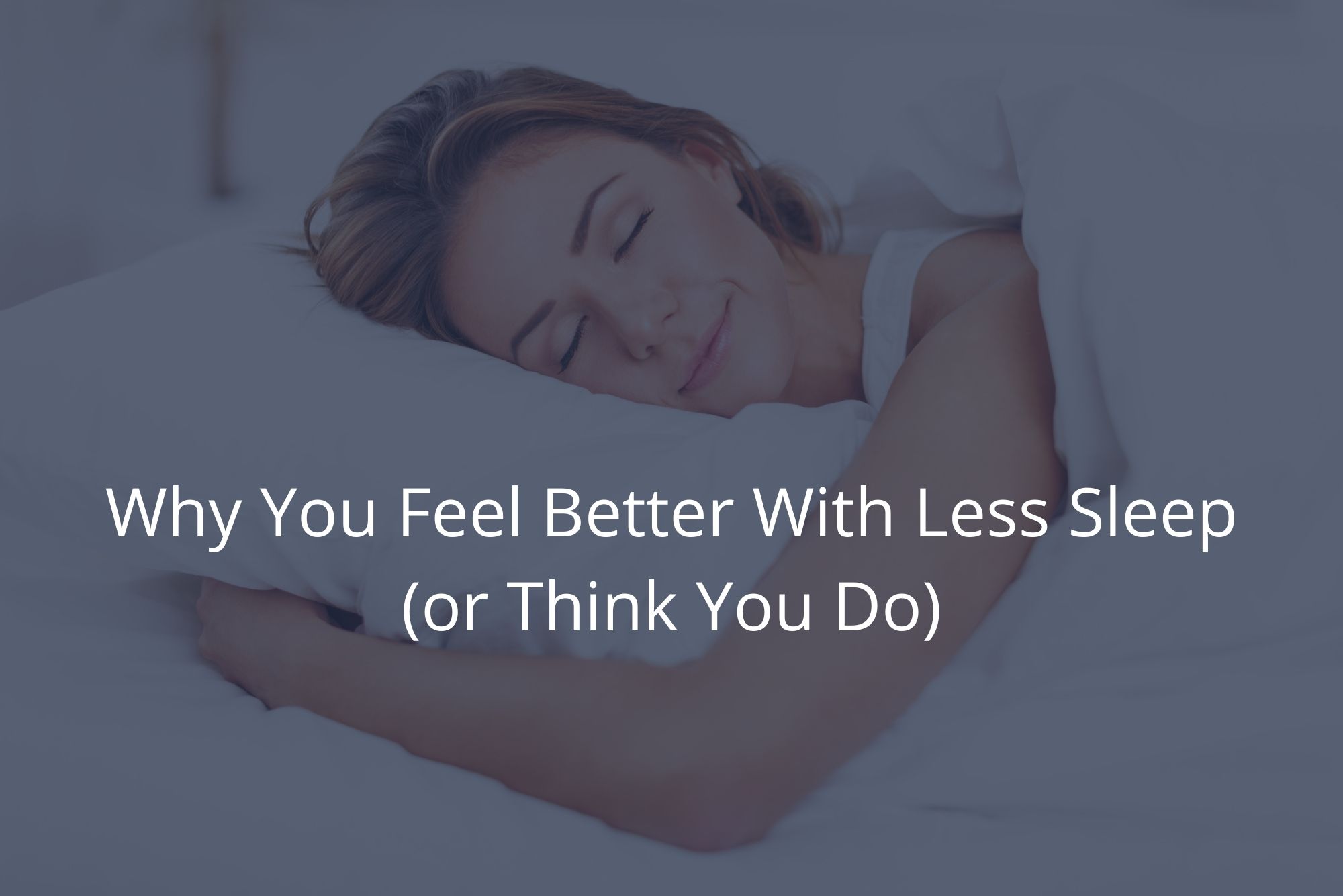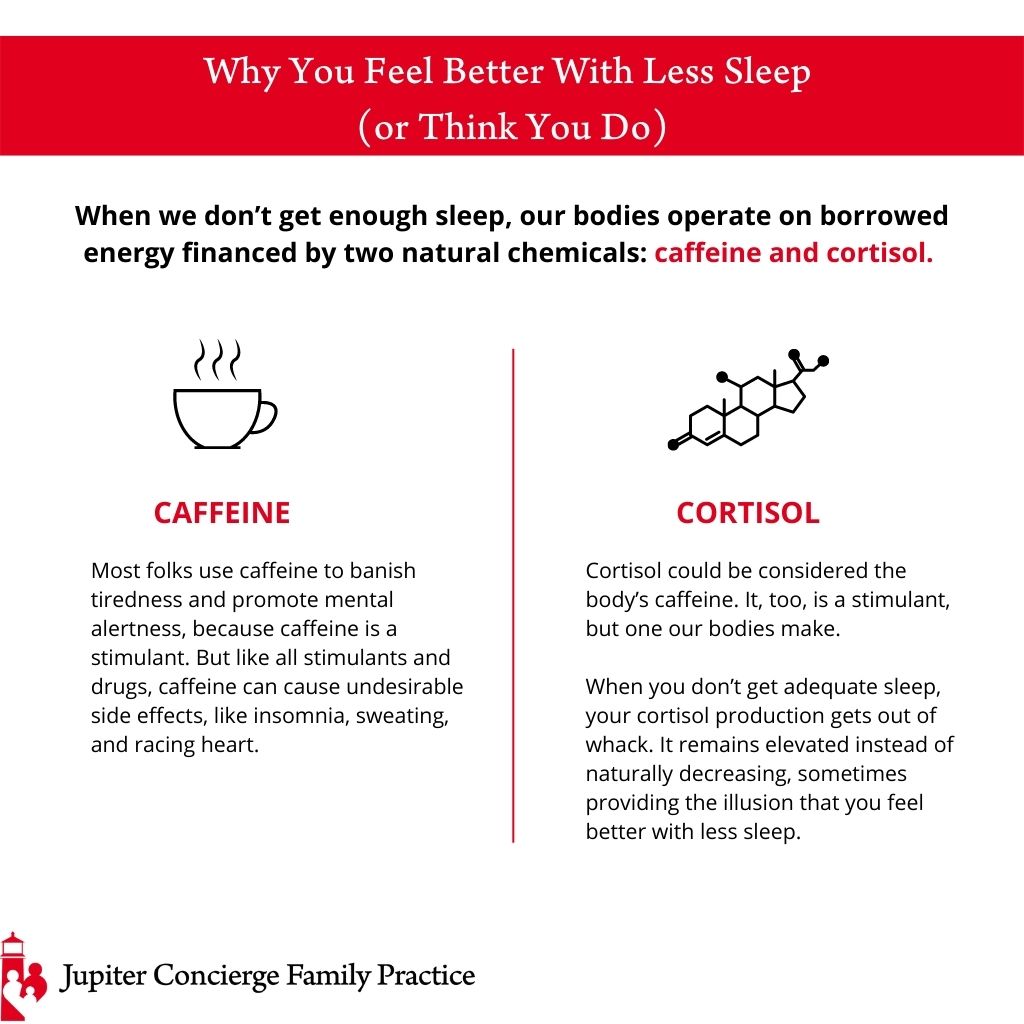
As a physician, I have many repeat conversations with patients about certain aspects of health. One of those aspects is sleep.
We have lots of questions about sleep because — along with exercise, diet, and a low-stress life — appropriate sleep is a cornerstone of good health. It’s a non-negotiable, fundamental human need.
I’m not overstating it here. It’s impossible to overemphasize sleep’s far-reaching effects. Whether we experience healing or havoc depends a great deal on sleep.
In our modern, overstimulated age, people are asking Google all kinds of sleep questions: Why do I feel better with less sleep? How do I train my body to need less sleep? How much sleep do I really need?
As you can imagine, the internet offers up tons of fads, hacks, and misconceptions in response.
These popular questions point to a desire to wriggle out of the necessity of sleep, or at least of enough sleep. It’s almost as if we believe that time spent sleeping is time wasted.
If sleep served no purpose other than a quick break from life, and if you could continue to feel better on less sleep, perhaps that would be true.
But in reality, sleep serves so many vital functions that keep your life intact. And you sometimes feel better on less sleep because of your body’s heroic struggle to compensate for the loss.
Let’s dive into this idea of “needing” less sleep, take a look at what’s happening internally when we sleep, and debunk the harmful ideas of sleep-minimization.
Why You Feel Better With Less Sleep (or Think You Do)
Most human beings need 7–9 hours of sleep each night. Yes, a small number of people need less than that, and a few need more. But by far, most people fall into this range.
If that’s true, then why do some people swear they feel better with less sleep than the recommended amount? In a nutshell, chemicals.
When we don’t get enough sleep, our bodies operate on borrowed energy financed by two natural chemicals: caffeine and cortisol.
Caffeine
Caffeine is the most-used drug in the world. Its presence is so integrated into our culture that most people don’t even consider it a drug. But it is.
Most folks use caffeine to banish tiredness and promote mental alertness, because caffeine is a stimulant. But like all stimulants and drugs, caffeine can cause undesirable side effects.
Adequate sleep is a more efficient means of cultivating mental agility and focus, and without the side effects caffeine can bring — like insomnia, sweating, and a racing heart.
Cortisol
Cortisol could be considered the body’s caffeine. It, too, is a stimulant, but one our bodies make.
When you feel yourself perk up while interacting with someone interesting, for example, that’s your cortisol level going up. It enables you to focus on the other person and join the conversation in a lively manner.
A cup of coffee has a similar effect, but your cortisol level naturally decreases when the need for focus ends. Caffeine just keeps right on stimulating.
When you don’t get adequate sleep, your cortisol production gets out of whack. It remains elevated instead of naturally decreasing, sometimes providing the illusion that you feel better with less sleep. But really our stress increases, and we lose the ability to have relaxed control.
This is hard on our bodies and has some serious consequences.
Sleep Makes Your Body Feel Better
Good sleep is restorative and crucial to bodily functions, whereas inadequate sleep can result in dysfunction and eventually lead to illness. Much like interest on credit card debt, the ill-effects of poor sleep can compound with devastating health results. This is why physicians are constantly advising the public to make getting enough sleep a priority.
As you might recall from the days-gone-by of high school biology, humans have both a sympathetic and parasympathetic nervous system. These two systems can’t operate at the same time, meaning our bodies prioritize one over the other at any given moment.
Under attack, our bodies prioritize the sympathetic. Asleep, the parasympathetic takes the wheel.
The Sympathetic Nervous System
The sympathetic nervous system is responsible for active behavior, such as saving our lives through fight-or-flight responses. The sympathetic nervous system jumps in, takes over the control panel, and overrides other functions as needed.
If you’re an avid hiker on the Appalachian Trail, for example, you’ll be pretty hungry after a long day of walking. You might pull out some trail rations and find a nice spot to eat. But if a bear comes crashing toward you through the woods, you (a) drop your food and forget about your hunger, and (b) are energized to run. Your sympathetic nervous system pumps cortisol and adrenaline through your body, telling you that escape from the bear is paramount.
The Parasympathetic Nervous System
The parasympathetic nervous system, on the other hand, is responsible for functions that go on behind the scenes. It’s known as the “rest and digest” or “rest and repair” aspect of the nervous system. We could also think of it as a “defrag” process, putting everything back in its proper place. The parasympathetic nervous system concerns itself with non-urgent — but absolutely critical — processes.
As the cleanup crew of the body, the parasympathetic nervous system repairs our gut lining, destroys aberrant cells, and absorbs nutrients. It’s easy to sail through that list when reading, but I want to bring your attention back to it for a moment.
Functioning intestines are mission critical. The removal of abnormal cells means killing cancerous or precancerous cells. Nutrient absorption keeps us alive. This behind-the-scenes work is the immune system taking care of business.
And all of these crucial functions can only take place when the body is in a state of rest — not focused on daytime activities like bustling around multitasking or fleeing a bear in the woods.
The parasympathetic nervous system thrives when our body is sleeping or meditating. Inadequate sleep interrupts and weakens its ability to keep us well.
Someone recently asked me, “What suffers when you don’t get enough sleep?” That question can be answered in similar words: Everything suffers when you don’t get enough sleep.
Digestion, immunity, brain function, memory, mood, creativity… everything. These absolutely critical processes, and more — chromosome repair, neurotransmitter activity — all require sleep to occur.
Your sympathetic nervous system has one advantage: You can’t ignore it. If there’s a rampaging bear, it won’t allow you to keep scrolling through Instagram. But you can neglect your parasympathetic cleanup crew by choosing Netflix over adequate sleep.
How Much Sleep Should I Get?
You already know that people need between seven and nine hours of sleep. This range varies by individual, and it’s not static. If you’re healing from an injury, for example, you’ll need more sleep for a while.
To figure out how much sleep you need, make a few observations. Do you feel rested when you wake up? Can you function for the whole day (without chemical assistance)? Answering these questions will help you find a good nightly number.
Sleep duration is just part of the picture, however. When you get your 7–9 hours also matters.
There’s a window of time — between 10 p.m. and midnight — that’s important to allocate toward sleep. Those two hours are worth almost twice the value of any other two-hour period of the night. Strange as it may seem, it’s more restorative to sleep seven hours from 10:30 p.m. to 5:30 a.m. than from 12:30 a.m. to 7:30 a.m.
What’s so magical about the hours between 10 and 12? The human body’s natural circadian rhythm gets us into sleep cycles during that time. If we use those hours for something else — say, some late-night work — our cortisol level spikes and a second wind fills our sails. Then we miss those crucial hours and can’t fall asleep until far later.
Many people want to make getting enough sleep a priority, but sometimes life interferes. They may work late or have inconsistent hours, or they might have small children whose sleep habits don’t care about our evidence-based medical findings.
If you’re struggling with getting enough sleep, take a look at the sleep hygiene tips I share with my patients to help mitigate the challenges.

Dr. David Rosenberg
Dr. Rosenberg is a board-certified Family Physician. He received his medical degree from the University of Miami in 1988 and completed his residency in Family Medicine at The Washington Hospital in Washington, Pennsylvania in 1991. After practicing Emergency Medicine at Palm Beach Gardens Medical Center for two years, he started private practice in Jupiter, in 1993. He is an avid baseball fan and Beatles fanatic, since he was 8 years old. He has been married to his wife, Mary, since 1985 and has three grown children.
David completed additional studies at Mercer University, Macon, Georgia and obtained a BS in Chemistry in 1983.
“My interests include tennis, snow skiing, Pilates and self-development.”

Subscribe to our Newsletter!
Receive latest blog posts, health tips, and exclusive offers from Jupiter Concierge Family Practice straight to your inbox.

